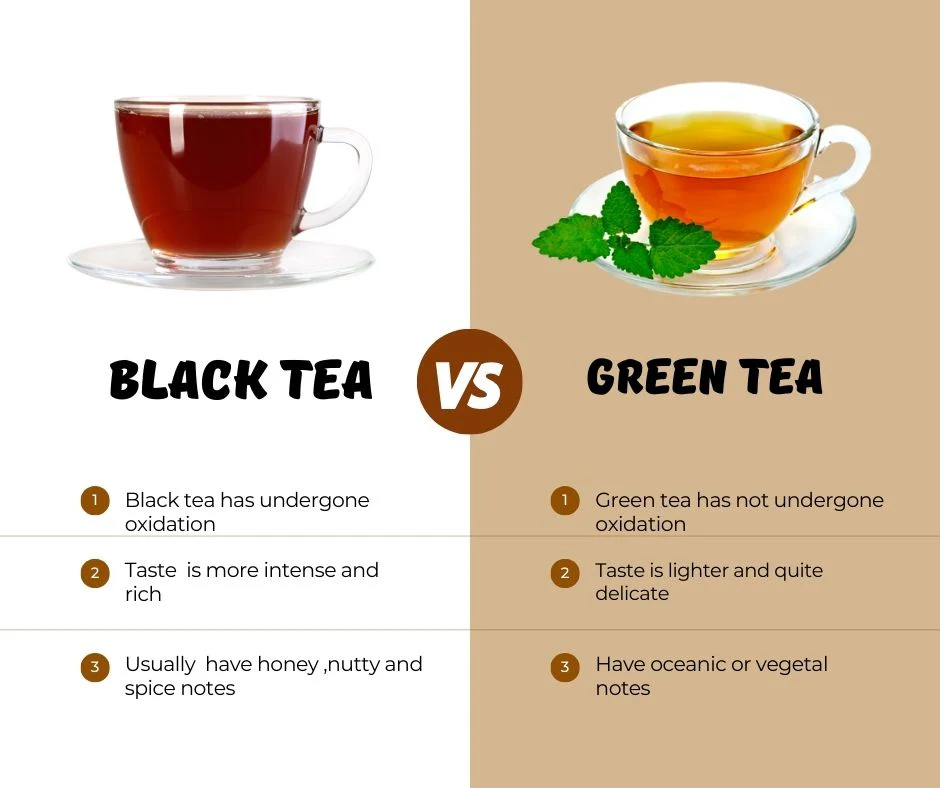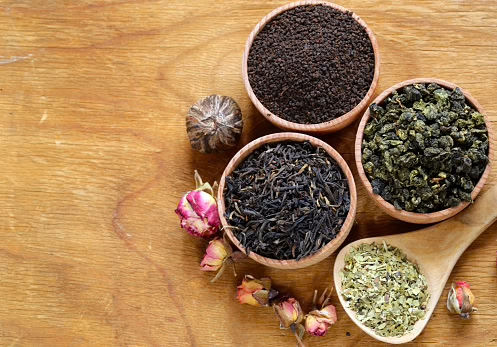When comparing green tea and black tea in terms of health benefits, both types offer unique advantages due to their distinct processing methods and chemical compositions. Here’s a detailed comparison based on the information gathered:
1. Antioxidant Content
- Green Tea: Rich in catechins, particularly epigallocatechin gallate (EGCG), which is known for its cancer-fighting properties and potential to enhance heart health. Green tea retains more catechins because it is not oxidized during processing.
- Black Tea: Contains theaflavins and thearubigins, which are formed during the oxidation process. These antioxidants also contribute to heart health and have anti-inflammatory properties, but they differ from the catechins found in green tea.
2. Cardiovascular Health
- Green Tea: Regular consumption may lower total and LDL cholesterol levels and improve blood vessel function, contributing to cardiovascular health. Some studies suggest that green tea drinkers may have a reduced risk of heart disease.
- Black Tea: Also associated with cardiovascular benefits, black tea has been linked to lower risks of heart disease and stroke. Research indicates that drinking two or more cups of black tea daily can be modestly associated with lower all-cause mortality risk, including heart-related issues.
3. Weight Management
- Green Tea: Often highlighted for its potential in weight loss due to its ability to increase fat oxidation and boost metabolism. The catechins in green tea are believed to enhance fat burning during exercise.
- Black Tea: While not as extensively studied for weight loss as green tea, black tea may still support weight management by promoting beneficial gut bacteria through its unique fermentation process.
4. Caffeine Content
- Green Tea: Generally contains less caffeine than black tea, which can provide a gentler increase in alertness without the jitters often associated with higher caffeine levels. It also contains L-theanine, which promotes relaxation.
- Black Tea: Higher in caffeine, making it a popular choice for those seeking a stronger energy boost. The combination of caffeine and L-theanine in both teas can enhance cognitive function while reducing stress.
5. Potential Cancer Prevention
- Green Tea: Some studies suggest that regular consumption may reduce the risk of certain cancers due to its high levels of EGCG and other catechins.
- Black Tea: While it also contains antioxidants that may help protect against cancer, the evidence is less robust compared to green tea’s association with cancer prevention.
6. Mental Health Benefits
- Both green and black teas may contribute positively to mental health by improving mood and cognitive function. The presence of L-theanine in both types helps reduce anxiety and promote relaxation.
Conclusion
Both green tea and black tea offer significant health benefits, but they do so through different mechanisms due to their unique compositions. Green tea is particularly noted for its high antioxidant content (especially catechins) and potential cancer-fighting properties, while black tea is recognized for its cardiovascular benefits and higher flavonoid content.
Ultimately, incorporating both types of tea into your diet can provide a broader range of health benefits. Each type complements the other, making them valuable additions to a balanced lifestyle focused on wellness.
Citations:
[1] https://www.thewhistlingkettle.com/blogs/wellness/black-vs-green-tea-which-is-healthier
[2] https://www.goodlifetea.com/blogs/news/green-tea-vs-black-tea
[3] https://pmc.ncbi.nlm.nih.gov/articles/PMC6571865/
[4] https://www.reddit.com/r/nutrition/comments/4j74gr/green_tea_vs_black_tea/
[5] https://www.healthline.com/nutrition/green-tea-vs-black-tea
[6] https://www.healthline.com/nutrition/top-10-evidence-based-health-benefits-of-green-tea
[7] https://artfultea.com/blogs/tea-wisdom/black-tea-vs-green-tea-whats-the-difference
[8] https://www.healthshots.com/healthy-eating/nutrition/healthy-teas-for-lungs/






